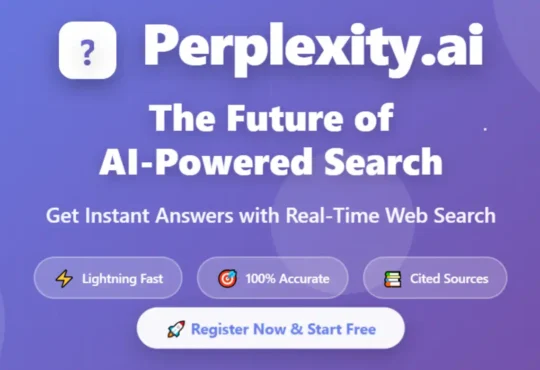Google is a household name and a leader in the digital world, playing a central role in how we access information, communicate, and even work online. With an ecosystem that stretches far beyond its original search engine roots, Google has grown into a comprehensive suite of tools and services that shapes the internet experience for billions of people around the globe.
In this guide, we’ll explore Google’s journey, its key services, and the influence it wields in the digital landscape.
The Birth of Google: A Search Engine Revolution
Founded in 1998 by Larry Page and Sergey Brin, Google started as a research project to make internet searches more accurate and relevant. Their idea was simple yet revolutionary to develop an algorithm that ranked web pages based on their relationships to one another, leading to what we now know as the PageRank algorithm. Google quickly gained popularity, outpacing other search engines by providing faster and more relevant search results.
Google’s Search Engine: Still at the Core
The Google search engine remains the core of its brand. Every day, over 5.6 billion searches are processed by Google, covering topics ranging from simple questions to complex research. Google’s search algorithm has evolved significantly, incorporating machine learning and artificial intelligence to provide better, more relevant results.

Key Features of Google Search
- Autocomplete: Saves time by suggesting queries as users type.
- Knowledge Graph: Offers direct answers to questions at the top of the search page.
- Featured Snippets: Provides concise answers to common questions.
- Voice Search: Allows users to search hands-free via spoken commands.
- Visual Search (Google Lens): Enables users to search using images instead of text.
Each of these features enhances the user experience, making search not only easier but more interactive and accessible to users of all backgrounds.
Beyond Search: The Google Ecosystem
Google has grown far beyond search, developing a range of tools and services that support productivity, creativity, and connectivity. These include Google Workspace, YouTube, Google Ads, Google Cloud, and the Android operating system. Each product offers distinct features, and together, they create a versatile digital ecosystem.

Google Workspace: Productivity in the Cloud
Google Workspace, formerly known as G Suite, is Google’s cloud-based productivity suite designed for businesses, educators, and individuals. It includes popular applications like:
- Gmail: An advanced email service with integrations across Google’s other tools.
- Google Drive: Cloud storage for files, with 15GB of free storage and paid options for more.
- Google Docs, Sheets, and Slides: Collaborative tools for document, spreadsheet, and presentation creation.
- Google Meet: A video conferencing tool that supports virtual meetings for individuals and businesses.
Google Workspace enhances collaboration by allowing multiple users to work on the same documents in real-time. This suite is widely adopted by organizations, offering efficient alternatives to traditional office software.
YouTube: The World’s Video Platform
YouTube, acquired by Google in 2006, has transformed into the world’s largest video-sharing platform. It hosts an incredible variety of content, from educational videos and news to entertainment and tutorials, with over 2 billion active monthly users. YouTube also plays a crucial role in Google’s advertising strategy, connecting brands with users through targeted video ads.
Android: Google’s Mobile Operating System
Android powers more than 70% of the world’s smartphones, making it a major player in mobile technology. Google’s open-source approach to Android has allowed a wide variety of device manufacturers to use and customize it, helping it gain a massive global user base. Android is integrated with Google services, giving users access to Google Play, Gmail, and other apps straight from their mobile devices.
Google Ads and Analytics: Fueling Digital Marketing
For businesses, Google provides powerful advertising and analytics tools that can reach millions of potential customers:
- Google Ads: Allows businesses to display ads in search results and on websites across the web. It uses targeted keywords to show relevant ads to users.
- Google Analytics: Provides detailed insights into website traffic, user behavior, and campaign performance, helping businesses optimize their digital presence.
Google Ads and Analytics have become essential for marketers looking to reach audiences effectively and measure their online success.
Google Cloud: Powering the Digital Transformation
Google Cloud Platform (GCP) is Google’s suite of cloud computing services, which includes computing power, data storage, and machine learning capabilities. GCP is known for its advanced AI tools and data analytics features, making it a popular choice among companies looking to leverage big data and artificial intelligence in their operations.
Google’s Commitment to Innovation: AI, Quantum Computing, and More

Google is constantly investing in emerging technologies. One of its most ambitious areas of development is artificial intelligence (AI). Google’s AI-driven products include:
- Google Assistant: A virtual assistant that helps with daily tasks, available on mobile devices and smart speakers.
- Google Translate: A powerful translation tool for real-time language conversion.
- Waymo: Google’s self-driving car project, which has made significant strides in autonomous driving technology.
Google is also exploring quantum computing through its Quantum AI lab, aiming to solve complex problems far beyond the capabilities of traditional computers.
Privacy and Data Security: Balancing Innovation with Responsibility

As Google expands its range of services, privacy and data security have become critical issues. The company has faced scrutiny regarding its data collection practices, leading to increased transparency and user control over personal information.
Google Account and My Activity pages allow users to view and manage their data across Google services. Google has also implemented features like Incognito Mode for private browsing and Two-Step Verification for enhanced security, reflecting its ongoing commitment to user privacy.
The Social Impact of Google: Education, Accessibility, and Information Sharing

Google has a positive impact on many aspects of society:
- Google for Education: Provides tools like Google Classroom to support digital learning.
- Accessibility Features: Google products incorporate features like voice typing and visual aids, making them accessible to people with disabilities.
- Information Sharing: Google has democratized information, making knowledge accessible to people around the world.
Through initiatives like Google.org, its philanthropic arm, Google also supports non-profits working on challenges like climate change, economic opportunity, and digital literacy.
The Future of Google: What Lies Ahead
Google is expected to continue innovating across its wide-ranging product lines. With investments in sustainability, healthcare technology, and advanced AI research, the company is well-positioned to remain a leader in the digital landscape.
Whether it’s through sustainable energy for data centers or pioneering efforts in medical AI, Google’s commitment to innovation keeps it at the forefront of the tech industry.
FAQs
What is Google primarily known for?
Google is primarily known for its search engine, which is the most widely used in the world. Beyond search, Google offers tools like Gmail, Google Drive, YouTube, and Google Ads.
How does Google make money?
Google’s main revenue comes from advertising, particularly through Google Ads and YouTube ads. Google also generates income from its cloud services and app store (Google Play).
What is Google Workspace?
Google Workspace is Google’s suite of productivity and collaboration tools, including Gmail, Google Docs, Sheets, Slides, and Meet. It’s designed for business, education, and personal use.
How secure is Google’s data storage?
Google uses high-level encryption, advanced data security protocols, and regular updates to protect user data. It also offers user controls to manage personal data across Google services.
What is the Google Knowledge Graph?
The Google Knowledge Graph is a database that enables Google to provide direct answers and relevant information about people, places, and things directly within search results.
Is Google a sustainable company?
Google is committed to sustainability, operating carbon-neutral data centers and investing in renewable energy. The company aims to operate on 100% renewable energy in the coming years.
Google’s impressive suite of tools and services has transformed it from a search engine into a digital ecosystem that touches almost every aspect of our online lives. With a relentless drive for innovation and a growing focus on privacy and sustainability, Google continues to shape the future of technology.
A big thank you for exploring TechsBucket! Your visit means a lot to us, and we’re grateful for your time on our platform. If you have any feedback or suggestions, we’d love to hear them.


